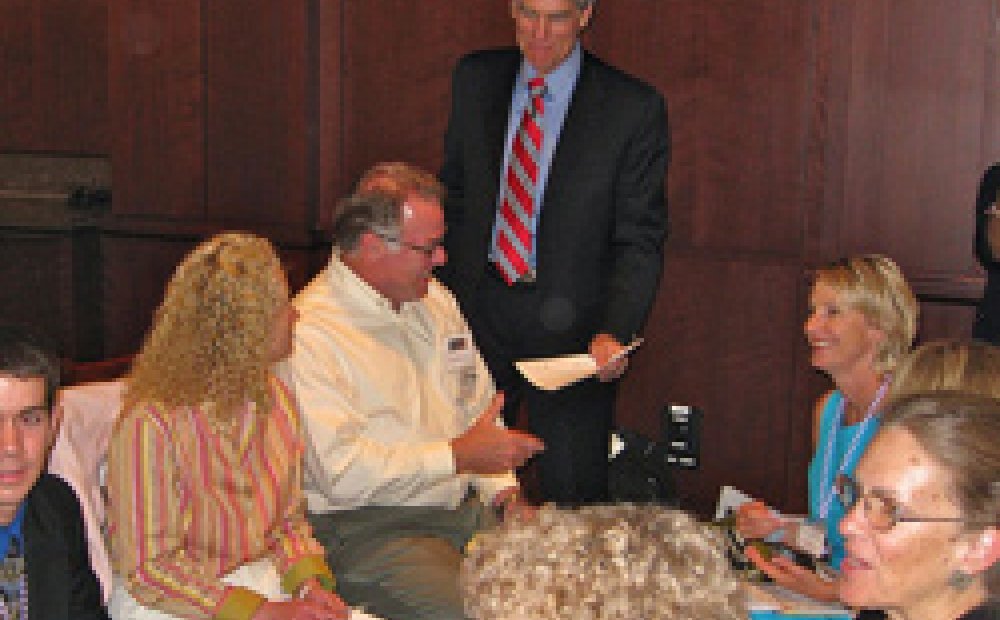Senator Mark Udall Hosts Constituent Discussion on Budget Hero

Nearly 100 Coloradoans convened on Capitol Hill in June for the three-day Colorado Capitol Conference. Participants ranged in age from college students to retirees, all coming to learn more about how policy is made in Washington.
On June 6, one session featured the Wilson Center’s Budget Hero game, which every participant had played in advance and all arrived ready to discuss their results. The nonpartisan game lets users try to balance the federal budget by first choosing badges that reflect their political priorities, then choosing policies that add or cut programs, spending, and taxes. Results are then calculated. Players can see how long it would take for their budget to go bust and share their results with friends on Facebook and Twitter.
The game continues to be updated with the latest Congressional Budget Office projections and, in fact, an election edition will be launched in September after the Democratic and Republican Conventions, which will include three new value badges. The Obama and Romney badges will allow users to play out those economic policies and see where they might lead; a January Surprise badge will be based on tax provisions and other economic policies set to expire in January 2013.
The Coloradoans broke into groups to discuss their results and impressions. One group noted that every aspect of the budget must be cut to some degree to have an impact. They found that cutting one aspect of the budget would have ripple effects on other policy areas. Others debated short-term savings vs. long-term efficiency down the line. One participant noted, “If you complete the game based on what you’re passionate about, you’ll go bankrupt quickly. But if you’re pragmatic, you’re more likely to have a successful outcome.”
Another participant noted that, after playing the game, he has come to believe balancing the budget cannot be accomplished without addressing both health care and social security. Another group questioned whether aspects of the defense budget could be safely cut without jeopardizing national security or U.S. competitiveness. Still others had more definitive suggestions, asserting the need to reduce defense spending, taxes, and entitlements; simplify regulations; and shift to more public-private sector partnerships. This group also considered if some power could be decentralized and shifted to the states.
The Wilson Center’s David Rejeski, director of the Science, Technology and Innovation Program, said the game lets users share demographic data, including breaking that data down by region. In Colorado, he said, the majority of players were self-identified independents ranging from 18-64 years old. The most popular polices played among Colorado Democrats were: reforming the tax code; tax breaks for oil companies, decreasing troops, funding for clean energy, and increasing how much the wealthy pay for prescription drugs. Among Colorado Republicans, he said the most popular policies included: cutting discretionary spending, increasing the Social Security recipient age, increasing Social Security benefits, reducing the federal travel budget, and rapidly cutting troops.
Across the country, Rejeski said some policies are popular across the board regardless of political affiliation. One such policy, he noted, is requiring the wealthy to pay more for prescription drugs.
Rejeski noted some other interesting demographic data. The average age of gamers is mid-30s and many of them are women. The Budget Hero game, co-developed with American Public Media and the gaming company 360Kid, has been played more than 1.5 million times. A companion teacher site includes new lesson plans for 12th grade economic and civics classes, as efforts continue to promote Budget Hero in schools nationwide. The new Budget Hero version is due out this Fall.
Speakers

Former Director, Science and Technology Innovation Program, Wilson Center
Hosted By

Science and Technology Innovation Program
The Science and Technology Innovation Program (STIP) serves as the bridge between technologists, policymakers, industry, and global stakeholders. Read more
